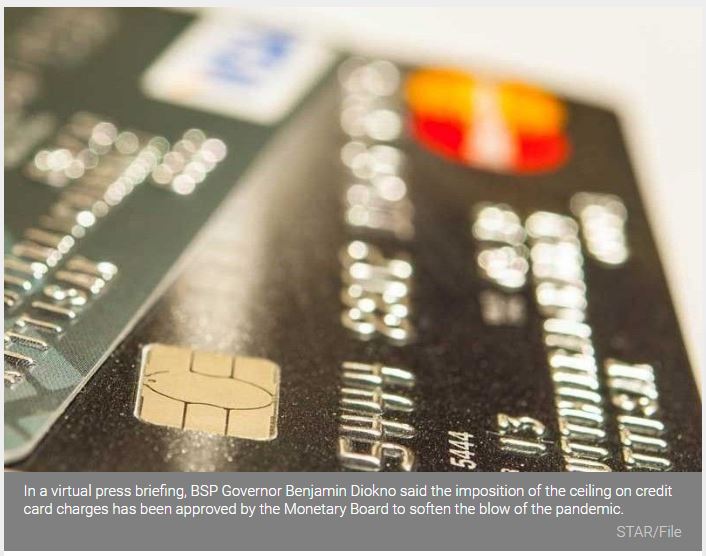Philippines: BSP sets cap on credit card charges
MANILA, Philippines — The Bangko Sentral ng Pilipinas (BSP) is imposing a 24 percent cap on the annual interest rate on all credit card transactions starting Nov. 3 to ease the financial burden of consumers and small enterprises amid the COVID-19 pandemic.
In a virtual press briefing, BSP Governor Benjamin Diokno said the imposition of the ceiling on credit card charges has been approved by the Monetary Board to soften the blow of the pandemic.
“The interest rate cap on credit card receivables aims to ease the financial burden of consumers and micro, small and medium enterprises amid a difficult economic environment caused by the COVID-19 pandemic,” Diokno said.
The BSP chief said the policy also provides that interest rates or finance charges on the unpaid outstanding credit card balance of a cardholder should not exceed two percent per month.
The STAR reported last month that the BSP was planning to impose a 24 percent cap on the finance charges banks and financial institutions collect from credit card loans.
Diokno said the new issuance prescribes a separate interest rate ceiling for credit card installment loans. For these transactions, credit card issuers may only charge monthly add-on rates up to a maximum of one percent.
Meanwhile, Diokno said no other charge or fee could be imposed or collected on credit card cash advances except for a maximum processing fee of P200 per transaction starting Nov. 3.
He said the maximum rates and fees are subject to review by the BSP every six months.
According to the BSP, the reform initiative is pursuant to its supervisory authority over all credit card issuers under the Credit Card Industry Regulation Law.
“Amid the rising use of electronic platforms for payments, the issuance will enable credit cardholders to settle financial transactions under more affordable pricing terms,” Diokno said.
The setting of a maximum ceiling on interest or finance charges on credit card transactions is also in keeping with the country’s current low interest rate environment.
The new regulation also waives the requirement for credit card issuers to notify the cardholder of the said changes on interest or finance charges at least 90 calendar days before such changes take effect.
Veronica Bayangos, director of the BSP’s Supervisory Policy and Research Department, said existing data showed the average annualized interest rate on credit card receivables range from 18 percent to as high as 58 percent in the first semester.
Based on the credit card business activity report, Bayangos said the average annualized interest rate for all types of cardholders, both premium and non-premium, was around 26 percent as of end-June.
Bayangos said the Bankers Association of the Philippines (BAP) and the Credit Card Association of the Philippines (CCAP) both agreed on the imposition of the ceiling on credit card charges.
“We are confident that banks will comply or will observe the limit because before we issued this policy, we coordinated with our counterparts. So we do not expect any non-compliance from this policy approach,” Bayangos said.
Preliminary data from the BSP showed loan disbursements of big banks amounted to P9.28 trillion as of end- June, P817 billion higher than the P8.47 trillion released a year ago.
Credit card loans jumped by 28.4 percent to P410.4 billion as of end- June from P319.64 billion last year.
Source: https://www.philstar.com/business/2020/09/25/2044872/bsp-sets-cap-credit-card-charges


 English
English




